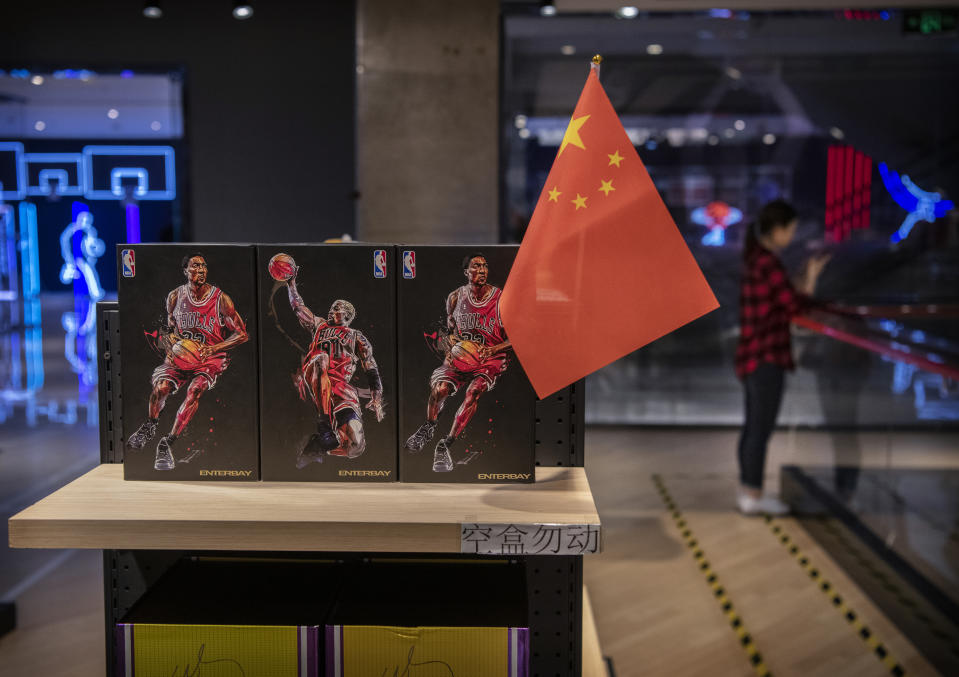Did China overplay its hand in trying to silence NBA?
Protests in Hong Kong against a new law allowing extradition to mainland China that dissidents believe is anti-democratic and will undermine autonomy from China have been relentless and ongoing since March. They’ve included airport shutdowns, massive gatherings in the streets each weekend and occasional outbursts of violence.
During all that time, many in the United States, as well as around the world, paid little to no attention to the situation.
Then Daryl Morey, the general manager of the Houston Rockets, retweeted a simple message of support to Hong Kong last Friday to his 200,000 followers. Even though Twitter is banned in China, the communist government there went wild with an oversized reaction.
Certain business deals with the Rockets and the NBA were canceled, games were pulled off television and no one is sure if two exhibition contests scheduled in China this week will even be allowed to take place.
As a result … Hong Kong is in the news everywhere, reaching vast and new audiences. That includes, perhaps, people inside information-controlled mainland China.
Which makes it fair to wonder: Did China, in trying to wipe out a molehill, turn this into a mountain?
“I think there is a sense that the Chinese government has overplayed their hand and is now in an untenable position,” William Nee, a Hong Kong-based business and human rights analyst for Amnesty International, told Yahoo Sports. “It was one mild tweet.”
That one mild tweet turned part of the world’s attention on not just the protests, but on how the Chinese government controls its media, its business partners (including foreign governments) and the life of its citizens — all the way down to watching a simple basketball game.
“It’s exposed China to people all over the world in a very real and easy to understand way,” Nee said.
After a poorly worded, and hypocritical, initial response from the NBA that called Morey’s retweet “regrettable”, the league has appeared to find its footing. It has repeatedly said, at least publicly, that it supports its employees right to free expression.

“The NBA will not put itself in a position of regulating what players, employees and team owners say or will not say on these issues,” commission Adam Silver said in a statement. “We simply could not operate that way.”
China, meanwhile, has responded by continuing to push the NBA away from its citizens.
That’s a potentially big business hit for the league, which is incredibly popular among China’s 1.4 billion citizens. About as many Chinese (around 20 million) watch NBA Finals games live (despite a drastic time difference) as Americans. The NBA is a billion-dollar business in China and that doesn’t count ancillary deals such as shoe or soft drink companies that use star players as endorsers.
Yet China has something to lose here also. It is deathly afraid that comments on the Hong Kong protests — which it deems a “separatist movement” rather than a “pro-democracy movement” — moving from the relatively anonymous general manager to mega-star players such as LeBron James, Stephen Curry or James Harden.
Like any totalitarian regime, or good bully, it beat up on the weakest to scare the biggest and then used its state-run media to cheer it on and justify it.
Yet it didn’t appear that a week ago Hong Kong was even on the radar of any NBA players. Well, it is now. Whether they take up the cause or not is their business, but they are certainly aware of it.
Then there is this: Can China actually pull NBA games off local television permanently? It’s one thing to cancel a couple of preseason games, but the entire season or seasons?
“They could do it,” Nee said. “But given the popularity of the NBA, it would be a very unpopular decision. It would probably result in fans trying to follow the league online or trying to get VPNs (virtual private networks for internet access) to watch. And the government doesn’t want VPNs because then citizens can get over the firewall.
“The NBA is a different thing for the government to deal with. The people of China know and like it. The NBA probably has more leverage here than it realizes.”
The Chinese can limit or stop a lot of information, but if star players — or celebrities in any walk of life who are now clued in on this — start, say, writing “Hong Kong” on their shoes or relentlessly supporting the protests, that can break through the wall. If those same stars are banned, or limited, from doing business in China, then they may be even more motivated to do it.
Thus far, players have been fairly quiet. Even usually outspoken Golden State Warriors coach Steve Kerr has sat it out. That could change at any moment though, especially once the Los Angeles Lakers and Brooklyn Nets, currently sitting in Shanghai wondering if they will play, are safe at home. That the NBA is watched globally — and has so many non-American stars who might also weigh in — just furthers its power.
“The Chinese government is generally run by old, stodgy bureaucrats who really don’t understand public relations,” Nee said. “And NBA fans in China tend to be younger and more cosmopolitan. A lot of those people would look at this and not agree with the government. Canceling the NBA is really difficult.”
As Silver visits Shanghai seeking a solution to a complex problem, no one is quite certain what will happen next. The NBA knows it can’t publicly fold to the Chinese without a backlash elsewhere, especially in its most important market, America. China, meanwhile, keeps pushing.
Meanwhile, everyone is talking about Hong Kong, which was what the communists don’t want and were trying to prevent until they turned one mild tweet into some kind of riddle wrapped in a mystery inside an enigma.
More from Yahoo Sports:

 Yahoo Lifestyle
Yahoo Lifestyle 
